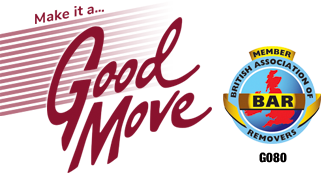For a friendly, reliable local removals company with a personal touch… Make It a Good Move!
Shipping to Philippines
Are you planning a move to the Philippines? GoodMove offers a full or part load removals service to the Philippines and other countries and islands in Southeast Asia.
GoodMove have moved individuals and families around the world for over 34 years. We have the necessary knowledge and expertise to plan and execute your international move with relative ease.
For international moves, we can export your possessions and have them delivered to your new destination. Through our industry partners we negotiate the best shipping and air freight rates to keep our prices competitive.
To find out more about our removals to Philippines service or any other destination don’t hesitate to contact us today. Call us on the above listed number of fill out a quick quote form and we’ll be in touch shortly.
Why Choose GoodMove?
Moving with GoodMove couldn’t be simpler. Our experienced and friendly team will be on hand to guide you throughout the process and will tailor your move to your time and budget.
We pack your belongings using a bespoke range of packing materials and deliver them right to your new home using our extensive fleet of vehicles. We can supply the following materials so all your items can be packed properly and avoid any damage in transit:
- Boxes
- Packing Paper
- Packing Cases
- Book Cartons
- Packing Tape
- Wine dividers
- Acid free paper (for silverware)
- Portable Wardrobes
- Bubble Wrap
Once we ascertain the volume of effects being moved we will send you a free no obligation written quotation. If satisfied we will then provide you with a full schedule detailing every aspect of your move, ensuring everything runs smoothly on the day.
We also offer a range of flexible storage solutions should you wish to take advantage of them.
Why Move to the Philippines?
Fed up with the dull British weather? It might be time to ditch the overcoats and head south for winter, permanently! The Philippines is an island paradise filled with technicolour sunsets, coconut trees and early morning wake up calls from the songbirds.
Figures from the Philippine Statistical Authority estimate the number of expats in the country to be between 250,00 – 300,000 in 2018. Here’s why:
The cost of living is much cheaper than the UK, with grocery shopping, dining out, clothing, and property all costing less in the Philippines.
Despite having a total of 87 native tongues, English is the most commonly spoken language, which makes acclimatising that much easier.
Choose from fishing, ziplining, canopy walks, lagoon hunting, nature preserves, hiking and some of the world’s best diving sites: Yapak (Boracay), Balicasag Fish Sanctuary (Bohol), Mactan Island (Cebu) and Monad Shoal (Malapascua).
Working opportunities in the capital city of Manila, which is fast emerging as a global centre for technology and pharmaceuticals with a strong start-up culture.
A strong expat community with an abundance of nightlife and socialising activities, particularly in Manila and Boracay.
Working in the Philippines
As a UK citizen, you must obtain a work visa before attempting to enter the country for employment.
Most foreigners will have arranged a job and as part of the contract employers will normally deal with the visa paperwork. Companies must prove to government authorities that they have made all possible attempts to employ a local Filipino before advertising internationally for any position.
This requirement has made getting a job here increasingly more difficult in recent years, but not impossible. For expats, the mining, construction and tourism industries offer the most likely opportunities for employment.
There is also a rapidly expanding tech and start-up scene with many UK and European citizens having successfully moved here and set up their own business.
Schools in the Philippines
The education system in the Philippines is largely modelled on the US education system.
Local education in the Philippines fares poorly compared with other countries in the region and the quality of education at public schools remains poor. Teachers are poorly paid and schools suffer from a lack of resource.
Most expats in the Philippines send their child to an International School where they can follow the curriculum of their home country or the International Baccalaureate Program. This is also a popular choice for those families relocating for work or the short term.
The best international schools are in Manila. Fees are expensive at approximately £6000 per child per year and must attend an interview before you child may attend.
Healthcare in the Philippines
Options for healthcare in the Philippines varies between private, public and barangay health centres in more rural areas).
Most hospitals in the Philippines are privately run and doctors speak a good level of English. However, public health care provision is often poorly managed and under-resourced.
As such most employers will include private health insurance as part of a formally arranged work contracts.
Many people from all over the world travel to have procedures in the country as they are considerably cheaper compared to Western treatments.
It is important to note that mosquitos are rife, especially between the wet months of June and September. You must receive your vaccinations and take a course of anti-malarial medication before arrival.
Property in the Philippines
Foreigners are subject to restrictions when it comes to buying property in the Philippines.
Expats may own part of or even a whole building but not the land on which it stands. It’s possible therefore to buy a condo or flat, providing the block remains at least 60% locally owned.
For more information on the process of buying property in the Philippines see this helpful article from TransferWise.
Because of these restrictions most expats opt to rent, which is cheap and friendly process.
The average rent per month, for a 3-bedroom apartment in centre of Manila is PHP 26,697 (£390) and on the outskirts PHP 15,163 (£221).
You will need to view prospective properties carefully. With a little invested time, and help from other expats, you will find that there are some lovely large apartments available for rent.
Travelling in the Philippines
There are various options for safe and convenient travel around the Philippines. Pedicabs, jeepneys and three wheeled taxis serve most towns and cities, as well as more traditional forms of transport, such as buses and taxis.
Rail transport is more limited and is mostly used within Metro Manila and the nearby province of Laguna. As an archipelago, boats and ferries are also a common means of ‘island hopping’.
Expats intending to drive may do so but must first apply for a local licence from the Land Transportation Office. Be warned however, that driving is often made an arduous task in the larger cities due to poor road planning and aggressive drivers.
Local Currency
The Peso (PHP) is the Philippine’s official currency. It is made up of 100 sub units called centimos.
Most ATMs in the Philippines accept major credit cards (MasterCard and Visa) for cash advances and debit cards that work on Cirrus (most machines) or Plus networks, for cash withdrawals.
Shipping My Effects to the Philippines
The whole moving experience can be incredibly stressful, especially so when relocating abroad. GoodMove has over 35 years of experience in the removal industry and can help make the process manageable and stress-free.
We can arrange a free no obligation home survey and quotation. It will be carried out by one of our qualified surveyors, who will able to answer any of the questions you have and offer advice where necessary.
The purpose of the survey is to determine the volume of effects you will be shipping. The cost of shipment is based on the space your effects will take up in the container. Following the visit, you will receive a free written no obligation quotation.
Export Packing for Removals to Philippines from UK
Our experienced UK-based teams pack and prepare your valuable, fragile and bulky furniture ready for export.
We use a modern range of environmentally friendly, purpose-made packing materials and can pack everything for you prior to your move. We wrap all china and glassware in special paper and then pack it in double-thickness cartons.
Bubble blanket and made-to-measure wooden crates provide extra padded protection for furniture and items requiring specialist care, such as antiques.
Upon arrival at your residence our trusted agents will place boxes and furniture in appropriate rooms as directed. They will unpack your belongings onto flat surfaces and dispose of all packing materials.
Storage
You may find you need to store some or all of your possessions for a period of time prior to moving abroad. Our depots offer secure containerised storage in personal dedicated storage containers. All our warehouses are clean, dry, secure and accredited to European standard BS EN 14873. Just speak to our surveyor for further information.
Our European partners can also offer you storage. You may be renting for a while and may not need all of your belongings to be delivered immediately. If so, you can arrange for certain items to be delivered and once settled in your new home, the rest can follow. Please note that storage rates may apply.
Contacting GoodMove
For further information on any of our removal services or any international destination, contact our international office. Alternatively complete the form below with your details and we will contact you.
Why Choose Us?
Worldwide Coverage
Our experienced team of removals specialists have been relocating customers all over the world since 1984.
100% Satisfaction
With a reputation for outstanding customer service, there's no better choice of removals firm for your next move.
Here For You
Our friendly support team are always on hand to offer help and guidance, whenever when you need it.

